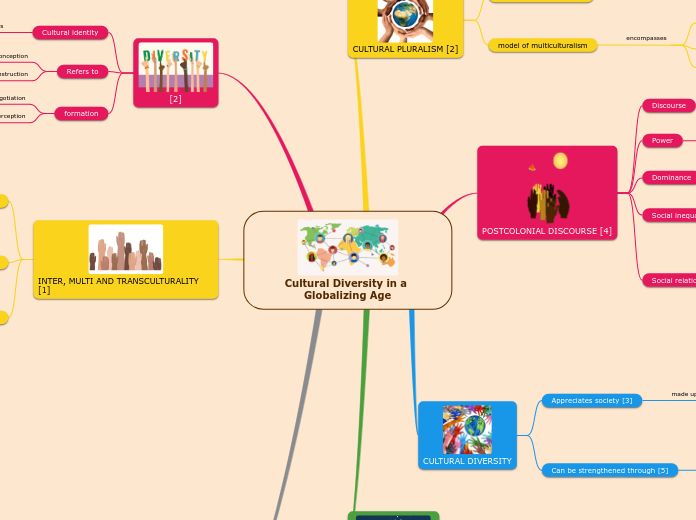Cultural Diversity in a Globalizing Age
REFERENCES [1] Bernabé, M.M. (2012). Pluriculturality, multiculturalism and interculturalism, knowledge for teaching. Revista Educativa Hekademos, 11 (5), 67-76.
[2] Pooch, M. (2016). Cultural Diversity in a Globalizing Age. In DiverCity – Global Cities as a Literary Phenomenon: Toronto, New York, and Los Angeles in a Globalizing Age (pp. 37-56). Bielefeld: Transcript Verlag. Retrieved August 11, 2020
[3] McCarthy, C., Giardina, M., Harewood, S. J., & Park, J. K. (2003). Afterword: Contesting culture: Identity and curriculum dilemmas in the age of globalization, postcolonialism, and multiplicity. Harvard Educational Review, 73(3), 449-465.
[4] Sanz Sabido, R., & Sanz Sabido, R. (2019). Postcolonial Critical Discourse Analysis: Theory and Method. The Israeli-Palestinian Conflict in the British Press, 19-53.
[5] Gibson, S. (2007). MET: Globalization and its Effect on Cultural Diversity. The University Of British Columbia. Recovered from: https://bit.ly/3K16ZVA
INTER, MULTI AND TRANSCULTURALITY [1]
Transculturality
Construct bridges
New forms of cultures
Cross social frontiers
Not stereotypes
Multiculturalism
Promotes
Not cultural exchange
Not social transformation
Cultural coexistences
Interculturality
Promote
Apprenticeship
Comprehension
Recognition
Diversity
[2]
formation
Self-perception
Social influences negotiation
Refers to
Self-construction
Self-conception
Cultural identity
Categorization of a person by others
GLOBALIZATION [5]
internationalization
growing interconnectedness
interdependence of
Institutions
People
CULTURAL DIVERSITY
Can be strengthened through [5]
globalization
by providing the
means and wherewithal to support cultural groups
to make a difference in society
Appreciates society [3]
made up of
different groups with different
Sexual orientations
Beliefs
Needs
Talents
Skills
Interests
POSTCOLONIAL DISCOURSE [4]
Social relations
Pedagogy should be organized around the thesis of the constructed nature of all knowledge. [2] (McCarthy et al., 2003).
Literature
Painting
Music
prophetic, anticipatory, and instructive [2] (McCarthy et al., 2003).
Social inequality
Dominance
Associations in the conceptualization of culture [2] (McCarthy et al., 2003)
Power
Limitations of monological and homogenizing approaches [2] (McCarthy et al., 2003)
Discourse
Culture
Identity
Curriculum [2] (McCarthy et al., 2003).
CULTURAL PLURALISM [2]
model of multiculturalism
encompasses
based groups
the government’s involvement in a society’s cultural and ethnic issues
the ‘vertical’ aspect of the mosaic metaphor
a socio-political strategy
targeted at new arrivers
to easily refer to the concept of
how cultures interact in a certain society

